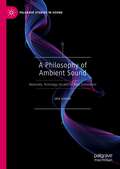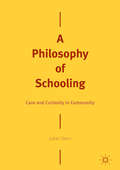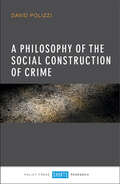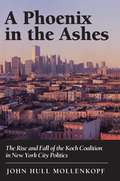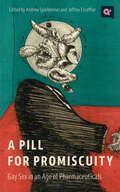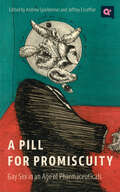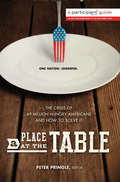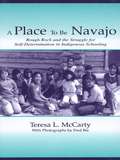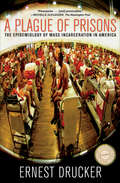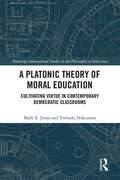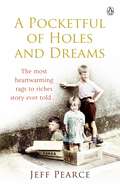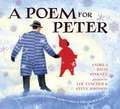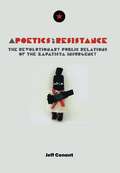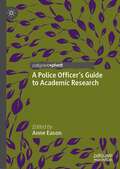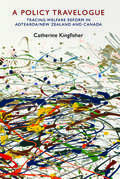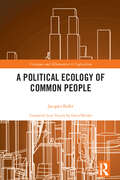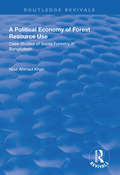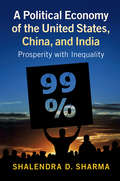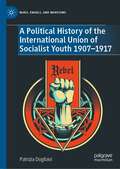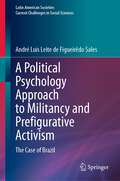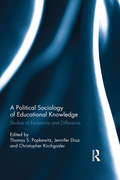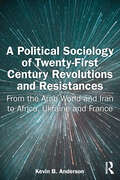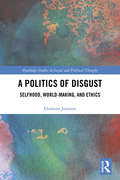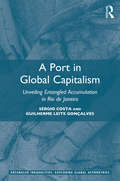- Table View
- List View
A Philosophy of Ambient Sound: Materiality, Technology, Art and the Sonic Environment (Palgrave Studies in Sound)
by Ulrik SchmidtThis book presents the first book-length study of ambient sound as a key issue in sound studies and sonic philosophy. Taking a broad, media-philosophical approach, it explores ambient sound as a basic dimension of the sonic environment, sonic technologies, sonic arts and the material staging of listening.Through analyses of key concepts such as surroundability, mediatization, immanence, synthetization and continuous variation, the book elucidates how ambient aspects of sound influence our conceptions of what sound is and how it affects us by exposing sound’s relation to basic categories such as space, time, environment, medium and materiality. It also illuminates how the strategic production of ambient sound constitutes a leading aesthetic paradigm that has been a decisive factor in the shaping of the modern sonic environment – from key developments in experimental and popular music, sound art and cinematic sound design to the architectural-technological construction of listening spaces in concert halls and theaters and in current streaming infrastructures, digital surround sound and the everyday aesthetics of headphone listening.
A Philosophy of Schooling: Care and Curiosity in Community
by Julian SternThis book provides an optimistic account of the value and role of schooling. Schooling is a common but not universal approach to education and has need of its own distinctive justification, in contrast to other approaches such as home-based or work-based education. The book tackles and rejects the various large-scale ‘functional’ theories of schooling which continue to dominate current debates and policies, such as schooling supporting employment and the economy, or developing citizenship. Instead, it argues that schooling and schools should be viewed as places to learn community within and through community. The lived reality of relationships within schools, based on care and curiosity, is as strong as ever: and upon this foundation is built an original philosophy of schooling. This reflective book will appeal to students and scholars of philosophy of education and to all professionals concerned with schools.
A Philosophy of the Social Construction of Crime
by David PolizziIt is well known that the social definition of individuals and ethnic groups helps legitimize how they are addressed by law enforcement. The philosophy of the social construction of crime and criminal behaviour reflects how individuals, such as police officers, construct meaning from the perspective from which they emerge, which in turn influences their law enforcement outlook. In the field, this is generally viewed through a positivist frame of reference which fails to critically examine assumptions of approach and practice. Written by an international specialist in this area, this is the first book which attempts to situate the social construction of crime and criminal behaviour within the philosophical context of phenomenology and how these constructions help inform, and ultimately justify, the policies employed to address them. Challenging existing thinking, this is essential reading for academics and students interested in social theory and theories of criminology.
A Phoenix in the Ashes: The Rise and Fall of the Koch Coalition in New York City Politics
by John Hull MollenkopfIn the years following its near-bankruptcy in 1976 until the end of the 1980s, New York City came to epitomize the debt-driven, deal-oriented, economic boom of the Reagan era. Exploring the interplay between social structural change and political power during this period, John Mollenkopf asks why a city with a large minority population and a long tradition of liberalism elected a conservative mayor who promoted real-estate development and belittled minority activists. Through a careful analysis of voting patterns, political strategies of various interest groups, and policy trends, he explains how Mayor Edward Koch created a powerful political coalition and why it ultimately failed.
A Pill for Promiscuity: Gay Sex in an Age of Pharmaceuticals (Q+ Public)
by Andrew Holleran Jeffrey Escoffier Kane Race Andrew R. Spieldenner Steve MacIsaac Daniel Felsenthal Nicolas Flores Alex Garner Deion Hawkins Pam Dore Addison Vawters Lore Tta LeMaster Ariel Sabillon Justice Jamal Jones Jeff WeinsteinFor a generation of gay men who came of age in the 1980s and 1990s, becoming sexually active meant confronting the dangers of catching and transmitting HIV. In the 21st century, however, the development of viral suppression treatments and preventative pills such as PrEP and nPEP has massively reduced the risk of acquiring HIV. Yet some of the stigma around gay male promiscuity and bareback sex has remained, inhibiting open dialogues about sexual desire, risk, and pleasure. A Pill for Promiscuity brings together academics, artists, and activists—from different generations, countries, ethnic backgrounds, and HIV statuses—to reflect on how gay sex has changed in a post-PrEP era. Some offer personal perspectives on the value of promiscuity and the sexual communities it fosters, while others critique unequal access to PrEP and the increased role Big Pharma now plays in gay life. With a diverse group of contributors that includes novelist Andrew Holleran, trans scholar Lore/tta LeMaster, cartoonist Steve MacIsaac, and pornographic film director Mister Pam, this book asks provocative questions about how we might reimagine queer sex and sexuality in the 21st century.
A Pill for Promiscuity: Gay Sex in an Age of Pharmaceuticals (Q+ Public)
by Andrew Holleran Jeffrey Escoffier Kane Race Andrew R. Spieldenner Steve MacIsaac Daniel Felsenthal Nicolas Flores Alex Garner Deion Hawkins Pam Dore Addison Vawters Lore Tta LeMaster Ariel Sabillon Justice Jamal Jones Jeff WeinsteinFor a generation of gay men who came of age in the 1980s and 1990s, becoming sexually active meant confronting the dangers of catching and transmitting HIV. In the 21st century, however, the development of viral suppression treatments and preventative pills such as PrEP and nPEP has massively reduced the risk of acquiring HIV. Yet some of the stigma around gay male promiscuity and bareback sex has remained, inhibiting open dialogues about sexual desire, risk, and pleasure. A Pill for Promiscuity brings together academics, artists, and activists—from different generations, countries, ethnic backgrounds, and HIV statuses—to reflect on how gay sex has changed in a post-PrEP era. Some offer personal perspectives on the value of promiscuity and the sexual communities it fosters, while others critique unequal access to PrEP and the increased role Big Pharma now plays in gay life. With a diverse group of contributors that includes novelist Andrew Holleran, trans scholar Lore/tta LeMaster, cartoonist Steve MacIsaac, and pornographic film director Mister Pam, this book asks provocative questions about how we might reimagine queer sex and sexuality in the 21st century.
A Place at the Table: The Crisis of 49 Million Hungry Americans and How to Solve It
by Peter Pringle Participant MediaForty-nine million people#151;including one in four children#151;go hungry in the U. S. every day, despite our having the means to provide nutritious, affordable food for all. Inspired by the acclaimed documentaryA Place at the Table, this companion book offers powerful insights from those at the front lines of solving hunger in America, including: Jeff Bridges, Academy Award#150;winning actor, cofounder of the End Hunger Network, and spokesperson for the No Kid Hungry Campaign, on raising awareness about hunger Ken Cook, president of Environmental Working Group, unravels the inequities in the Farm Bill and shows how they affect America’s hunger crisis Marion Nestle, nutritionist and acclaimed critic of the food industry, whose latest work tracks the explosion of calories in today’s #147;Eat More” environment Bill Shore, Joel Berg, and Robert Egger, widely-published anti-hunger activists, suggest bold and diverse strategies for solving the crisis Janet Poppendieck, sociologist, bestselling author, and well-known historian of poverty and hunger in America, argues the case for school lunch reform Jennifer Harris, of Yale University’s Rudd Center for Food Policy and Obesity, uncovers the new hidden persuaders of web food advertisers David Beckmann, head of Bread for the World, andSarah Newman, researcher onA Place at the Table, explore the intersection of faith and feeding the hungry Mariana Chilton, Philadelphia pediatrician and anti-hunger activist, tells the moving story of her extraordinary lobby group, Witnesses to Hunger Tom Colicchio, chef and executive producer of television’sTop Chef, presents his down-to-earth case to Washington for increases in child nutrition programs Andy Fisher, veteran activist in community food projects, argues persuasively why we have to move beyond the charity-based emergency feeding program Kelly Meyer, cofounder of Teaching Gardens, illuminates the path to educating, and providing healthy food for, all children Kristi Jacobson and Lori Silverbush, the film’s directors/producers, tell their personal stories of how and why they came to make the documentary Hunger and food insecurity pose a deep threat to our nation. A Place at the Tableshows they can be solved once and for all, if the American public decides#151;as they have in the past#151;that making healthy food available, and affordable, is in the best interest of us all.
A Place to Be Navajo: Rough Rock and the Struggle for Self-Determination in Indigenous Schooling (Sociocultural, Political, and Historical Studies in Education)
by Teresa L. McCartyA Place To Be Navajo is the only book-length ethnographic account of a revolutionary Indigenous self-determination movement that began in 1966 with the Rough Rock Demonstration School. Called Diné Bi'ólta', The People's School, in recognition of its status as the first American Indian community-controlled school, Rough Rock was the first to teach in the Native language and to produce a body of quality children's literature by and about Navajo people. These innovations have positioned the school as a leader in American Indian and bilingual/bicultural education and have enabled school participants to wield considerable influence on national policy. This book is a critical life history of this singular school and community. McCarty's account grows out of 20 years of ethnographic work by the author with the Diné (Navajo) community of Rough Rock. The story is told primarily through written text, but also through the striking black-and-white images of photographer Fred Bia, a member of the Rough Rock community. Unlike most accounts of Indigenous schooling, this study involves the active participation of Navajo community members. Their oral testimony and that of other leaders in Indigenous/Navajo education frame and texture the account. Informed by critical theories of education, this book is not just the story of a single school and community. It is also an inquiry into the larger struggle for self-determination by Indigenous and other minoritized communities, raising issues of identity, voice, and community empowerment. A Place To Be Navajo asks whether school can be a place where children learn, question, and grow in an environment that values and builds upon who they are. The author argues that the questions Rough Rock raises, and the responses they summon, implicate us all.
A Plague of Prisons: The Epidemiology of Mass Incarceration in America
by Ernest DruckerThe public health expert and prison reform activist offers &“meticulous analysis&” on our criminal justice system and the plague of American incarceration (The Washington Post). An internationally recognized public health scholar, Ernest Drucker uses the tools of epidemiology to demonstrate that incarceration in the United States has become an epidemic—a plague upon our body politic. He argues that imprisonment, originally conceived as a response to the crimes of individuals, has become &“mass incarceration&”: a destabilizing force that damages the very social structures that prevent crime. Drucker tracks the phenomenon of mass incarceration using basic public health concepts—&“incidence and prevalence,&” &“outbreaks,&” &“contagion,&” &“transmission,&” &“potential years of life lost.&” The resulting analysis demonstrates that our unprecedented rates of incarceration have the contagious and self-perpetuating features of the plagues of previous centuries. Sure to provoke debate and shift the paradigm of how we think about punishment, A Plague of Prisons offers a novel perspective on criminal justice in twenty-first-century America. &“How did America&’s addiction to prisons and mass incarceration get its start and how did it spread from state to state? Of the many attempts to answer this question, none make as much sense as the explanation found in [this] book.&” —The Philadelphia Inquirer
A Platonic Theory of Moral Education: Cultivating Virtue in Contemporary Democratic Classrooms (Routledge International Studies in the Philosophy of Education)
by Mark E. Jonas Yoshiaki NakazawaDiscussing Plato’s views on knowledge, recollection, dialogue, and epiphany, this ambitious volume offers a systematic analysis of the ways that Platonic approaches to education can help students navigate today’s increasingly complex moral environment. Though interest in Platonic education may have waned due to a perceived view of Platonic scholarship as wholly impractical, this volume addresses common misunderstandings of Plato’s work and highlights the contemporary relevance of Plato’s ideas to contemporary moral education. Building on philosophical interpretations, the book argues persuasively that educators might employ Platonic themes and dialogue in the classroom. Split into two parts, the book looks first to contextualise Plato’s theory of moral education within political, ethical, and educational frameworks. Equipped with this knowledge, part two then offers contemporary educators the strategies needed for implementing Plato’s educational theory within the pluralistic, democratic classroom setting. A Platonic Theory of Moral Education will be of interest to academics, researchers, and post-graduate students in the fields of: ethics; Plato scholarship; moral psychology; educational foundations; and the philosophy of education. This book would also benefit graduate students and scholars in teacher education. Mark E. Jonas is Professor of Education and Professor of Philosophy (by courtesy) at Wheaton College, US. Yoshiaki Nakazawa is Assistant Professor of Education at University of Dallas, US.
A Pocketful of Holes and Dreams
by Jeff PearceThe poor boy who made his fortune . . . not just once but twice.Little Jeff Pearce grew up in a post-war Liverpool slum. His father lived the life of an affluent gentleman whilst his mother was forced to steal bread to feed her starving children. Life was tough and from the moment Jeff could walk he learned to go door to door, begging rags from the rich, which he sold down the markets. Leaving school at the age of fourteen, he embarked on an extraordinary journey, and found himself, before the age of thirty, a millionaire.Then, after a cruel twist of fate left him penniless, he, his wife and children were forced out of their beautiful home . . .With nothing but holes in his pockets, Jeff had no alternative but to go back down the markets and start all over again. Did he still have what it took? Could he really get back everything he had lost?A Pocketful of Holes and Dreams is the heartwarming true story of a little boy who had nothing but gained everything and proof that, sometimes, rags can be turned into riches . . .______________'An inspirational tale of hard work and determination' 5* Reader review 'I just loved this book from the first chapter - I was gripped' 5* Reader review
A Poem for Peter: The Story of Ezra Jack Keats and the Creation of The Snowy Day
by Rosemary Wells Andrea Davis Pinkney Steve Johnson Lou Fancher<p>A celebration of the extraordinary life of Ezra Jack Keats, creator of The Snowy Day. <p>The story of The Snowy Day begins more than one hundred years ago, when Ezra Jack Keats was born in Brooklyn, N.Y. The family were struggling Polish immigrants, and despite Keats's obvious talent, his father worried that Ezra's dream of being an artist was an unrealistic one. But Ezra was determined. By high school he was winning prizes and scholarships. Later, jobs followed with the WPA and Marvel comics. But it was many years before Keats's greatest dream was realized and he had the opportunity to write and illustrate his own book. <p>For more than two decades, Ezra had kept pinned to his wall a series of photographs of an adorable African American child. In Keats's hands, the boy morphed into Peter, a boy in a red snowsuit, out enjoying the pristine snow; the book became The Snowy Day, winner of the Caldecott Medal, the first mainstream book to feature an African American child. It was also the first of many books featuring Peter and the children of his -- and Keats's -- neighborhood. <p>Andrea Davis Pinkney's lyrical narrative tells the inspiring story of a boy who pursued a dream, and who, in turn, inspired generations of other dreamers.</p>
A Poetics of Resistance
by Jeff ConantPart literary criticism, part media analysis, and part marketing handbook, A Poetics of Resistance provides a refreshingly new take on the Zapatistas. While much has been written on the history of the Zapatista insurgency and on the communiqués of Subcomandante Marcos, very little has been said about Zapatismo: the ideologies, organizing methodologies, and communications strategies of the movement. The appeal of the Zapatistas, and their survival, has as much to do with their goals as with the compelling and wildly effective language and aesthetics they've used to convey their vision. Weaving together varied elements of poetics and symbolism, Zapatismo has emerged as something entirely new: a resolutely radical public relations campaign for human liberation.The first "postmodern revolution" presented itself to the world through a complex and evolving web of propaganda, using a wide range of media: the colorful communiqués of Marcos; the ski masks, uniforms, toy dolls, and other accoutrements of the insurgent or sympathizer; and murals, songs, and other popular cultural forms. Employing persuasive publicity, myths, and symbols, the Zapatistas both communicated their message and developed a clear aesthetic that could contain many messages at once and self-replicate on a global scale. Jeff Conant offers an engaging and innovative tool for organizers and educators to understand how the Zapatistas' strategy works, and to continue developing and refining their effective messages of participatory, bottom-up revolution.Jeff Conant is a writer and activist in the San Francisco Bay Area and the author of A Community Guide to Environmental Health.
A Police Officer’s Guide to Academic Research
by Anne EasonThis book highlights how the practical skills of the police officer can be transferred into the realm of academic research and support them in becoming part of the evidence-based policing movement. It starts by exploring the professionalisation of the police service through higher education accreditation and the different methodologies of social research practice. Using operational comparisons and a little humour, it guides the reader through the swamp of concepts and processes, such as ethical approval, research paradigms and data gathering and analysis. It then takes them on a journey of reflection and reflexivity, challenging their own perspective on policing and working within the wider criminal justice sector and how they can make a valuable contribution to the development of policing practice.
A Policy Travelogue: Tracing Welfare Reform in Aotearoa/New Zealand and Canada
by Catherine KingfisherAn ethnography of the development and travel of the New Zealand model of neoliberal welfare reform, this study explores the social life of policy, which is one of process, motion, and change. Different actors, including not only policy élites but also providers and recipients, engage with it in light of their own resources and knowledge. Drawing on two analytic frameworks of the contemporary anthropology of policy-translation and assemblage-Kingfisher situates policy as an artifact and architect of cultural meaning, as well as a site of power struggles. All points of engagement with policy are approached as sites of policy production that serve to transform it as well as reproduce it. As such, A Policy Travelogue provides an antidote to theorizations of policy as a-cultural, rational, and straightforwardly technical.
A Political Ecology of Common People (Critiques and Alternatives to Capitalism)
by Jacques BidetThis book advances a counter-intuitive thesis: modern attacks on the global ecological balance are exclusively the result of processes of social domination, whether they are based on class, gender or nation. If this is the case, then it follows that ecological struggle and social struggle are one and the same thing. The approach is inspired by Marx’s theory, as revisited through Bourdieu and Foucault, Rawls and Habermas, and Ostrom and Wallerstein. Based on a new concept, that of “metastructure” which defines the relationship between the structural and the symbolic, it confronts contemporary debates on class, gender andcoloniality, as well as on the state, the nation and the World-System. Global social-ecological destruction is thus analysed on three registers: that of capital, which produces for profit; that of (supposed) competent authority, which produces to produce; and that of the nation, which produces to conquer. Consumerism follows from productivism, not the other way around. The question of need takes precedence over that of desire. This metastructural configuration poses the imperative constantly renewed to counter the blind logic of capital with a rational logic of organisation, and, at the same time, to counter the logic of the organisers through a democratic discursive logic. This latter is the recourse of common people. The Global South is on the front line of this struggle; and women’s struggle bears its own decisive ecological impulse.
A Political Economy of Forest Resource Use: Case Studies of Social Forestry in Bangladesh (Routledge Revivals)
by Niaz Ahmed KhanPublished in 1998. An International monograph publishing series covering new research into the ‘green’ issues such as government, corporate and public responses to environmental hazards, the economics of green policies and the effectiveness of environmental protection programmes.
A Political Economy of the United States, China, and India: Prosperity With Inequality
by Shalendra D. SharmaThe precipitous rise in global and national economic inequality, which the inexorable force of globalization promised to address with affluence and abundance for all, has returned with a vengeance. The problem of worsening socioeconomic inequality and how best to ameliorate this pernicious resurgence occupies center stage of national and international politics. This study investigates the coexistence of high rates of economic growth and unparalleled prosperity (including a review of the decline in poverty levels in China and India and many other developing countries) with rises in income and wealth inequality in the United States, China, and India.<P><P> This book examines the overall effectiveness of the measures taken by these three countries to address such anomalies, and what they should do to tackle the problem of widening inequality. This study breaks new ground by providing an original comparative analysis of the challenges facing the world's three major economies.<P> Addresses why both democratic and authoritarian governance have failed to promote more equitable development.<P> Provides nuanced insights into the roots of inequality crises.<P> Offers solutions to address global economic inequality.
A Political History of the International Union of Socialist Youth 1907–1917 (Marx, Engels, and Marxisms)
by Patrizia DoglianiThis book represents a valuable contribution to the history of the Socialist Second International and, more generally, of European socialism between the Great Depression of the 1880s and WWI. It comes to fill a gap in the scholarship, insofar as it investigates the history of the Socialist Youth International. During the first phase of the making of socialist parties, this organization was in charge of the political and cultural education of the proletarian youth. Capitalizing on an approach based on social, quantitative and political history, and on an analysis of mentalities and languages, the book reconstructs the many-sidedness of the “school of recruits” of the social-democratic and revolutionary movements. The working conditions of youth in Europe, its unionization and economic struggles, the fight against militarism, the pedagogical work, the internationalism and the commitment to maintain peace, and the attitude of young militants towards Bolshevik revolution are some of the themes investigated in the book. It also clarifies the role and the engagement with the issue of the new generation shown by prominent figures of Marxism such as Karl Liebknecht, Jean Jaurès, Henri De Man, Willi Münzenberg, Henriette Roland Holst, and Robert Danneberg. Finally, the book constitutes also a page of European social and political history, reconstructed through the history of the various youth socialisms and their relationship with the Marxist tradition.
A Political Psychology Approach to Militancy and Prefigurative Activism: The Case of Brazil (Latin American Societies)
by André Luis SalesThis book frames a series of protests occurred in Brazil from 2013 to 2016 as exemplary cases of global trends in contentious politics to analyze the tension between two forms of collective action: the militant (militante) and the prefigurative activist (ativista). Building on sociology, political science, and psychology, it explores the relationship between protestors' activities and conceptions of political participation with their subjectivity and agency. The protest cycle triggered by the June 2013 events in Brazil gave strength and popularity to repertoires and strategies of collective action uncommon and innovative. Those praxes defied political parties' conventions, highlighted the limitations of militant unionist tradition, and brought prefigurative activism to the Brazilian left-wing agenda. In this book, Andre Luis Leite de Figueirêdo Sales combines theoretical tools and traditions from South and North America to build an interdisciplinary approach to Political Psychology and answer the question: what psycho-political differences lie behind the disparate forms of political action adopted by militantes (militants) and ativistas (prefigurative activists) in Brazil? Inspired by books of short stories, the chapters discuss different aspects of the distinction between militancy and prefigurative activism. On them, the author deals with problems such as: how are the ongoing changes in Brazilian protest culture connected with the rising popularity of autonomist movements across the globe? What differences does it make rooting protest strategies in principles like resistance or refusal? How does the culture informing militants and prefigurative activists' conduct affect their political goals and horizons? How does militant and prefigurative activist culture relate to militants and prefigurative activists' forms of political consciousness? A Political Psychology Approach to Militancy and Prefigurative Activism: The Case of Brazil will be a valuable tool for social movement researchers from different disciplines interested in understanding how can subjectivity be, at the same time, a determiner of activities performed in collective action, and determined by these same transformative deeds.
A Political Sociology of Education Policy
by Helen GunterCritical education policy research has a long tradition of political sociology. Drawing on data and analysis from the Education Policy Knowledgeable Polity (EPKP) project, supported by funders such as the British Academy and the Economic and Social Research Council, this book presents a new political sociology for framing, conducting and presenting critical education policy research. In doing so, it will be the first in the field to interconnect political thinking from Arendt with sociological thinking from Bourdieu, producing innovative analysis for and about educational reform.
A Political Sociology of Educational Knowledge: Studies of Exclusions and Difference
by Thomas A. Popkewitz Jennifer Diaz Christopher KirchgaslerBringing together the sociology of knowledge, cultural studies, and post-foundational and historical approaches, this book asks what schooling does, and what are its limits and dangers. The focus is on how the systems of reason that govern schooling embody historically generated rules and standards about what is talked about, thought, and acted on; about the "nature" of children; about the practices and paradoxes of educational reform. These systems of reason are examined to consider issues of power, the political, and social exclusion. The transnational perspectives interrelate historical and ethnographic studies of the modern school to explore how curriculum is translated through social and cognitive psychologies that make up the subjects of schooling, and how educational sciences "act" to order and divide what is deemed possible to think and do. The central argument is that taken-for-granted notions of educational change and research paradoxically produce differences that simultaneously include and exclude.
A Political Sociology of Twenty-First Century Revolutions and Resistances: From the Arab World and Iran to Africa, Ukraine and France
by Kevin AndersonThis book examines the possibilities – and realities – of positive, humanist change and revolution that have burst forth in the first decades of this century.Kevin B. Anderson critically examines the revolutions, uprisings, social movements, and forms of national resistance that have arisen across the Middle East and North Africa, Sudan, South Africa, Ukraine, and France in the past 15 years, providing a salient snapshot of geopolitical and social events in a way that is both timely and in-the-moment. The book represents an effort to analyze world events, especially revolutions and radical movements, in a dialectical manner, combining contemporary analysis of the class, gender, and ethnic dimensions of these upheavals with theoretical and historical reflection that engages Hegel, Marx, Lenin, Rosa Luxemburg, CLR James, Raya Dunayevskaya, and other thinkers in the Marxian tradition.A Political Sociology of Twenty-First Century Revolutions and Resistances is an important resource for researchers and current affairs opinion leaders, as well as a key text for courses in social change, political sociology, social movements, and contemporary social theory.
A Politics of Disgust: Selfhood, World-Making, and Ethics (Routledge Studies in Social and Political Thought)
by Eleonora JoensuuThis book explores the intersubjective nature of disgust, the fascination that often accompanies it—along with repulsion—and the ethical implications of the experience. With attention to what emotions do rather than what they necessarily are, it examines the ways in which disgust works to create structures of meaning about selfhood, interpersonal relationships, and the worlds we inhabit. Offering a critique of existing approaches to disgust, the author advances a feminist intersubjective perspective, drawing on the work of Jessica Benjamin to understand the relational aspects of disgust encounters. Thus, the focus is not on defining disgust definitively, nor debating what objects invoke disgust, nor on whether it is a universal experience, but on the effects of disgust once invoked, what the experience does and the impact it has. Through a case study of incarceration and death by self-inflicted strangulation—a death that was later ruled a homicide—this volume sheds light on the nature of the ethical demands of disgust and its nature as an active struggle for recognition. As such, A Politics of Disgust will appeal to scholars of gender studies, social theory and philosophy with interests in the emotions and intersubjectivity.
A Port in Global Capitalism: Unveiling Entangled Accumulation in Rio de Janeiro (Entangled Inequalities: Exploring Global Asymmetries)
by Sérgio Costa Guilherme Leite GonçalvesThrough a study of the port district of Rio de Janeiro and its history, from its emergence as a major slave market to its modern-day incarnation as a hub of tourism, real estate and financial speculation, this book examines the different dimensions of the manner in which capitalism expands its global process of accumulation to incorporate spaces not yet integrated into chains of value production. As such, it sheds new light on the use of explicit non-economic violence on the part of capitalist expansion, in the form of colonial or imperial policies, plundering or legal forms of expropriation. As such, it will appeal to sociologists, historians, economists, legal scholars and political theorists with interests in capitalism and inequalities.
